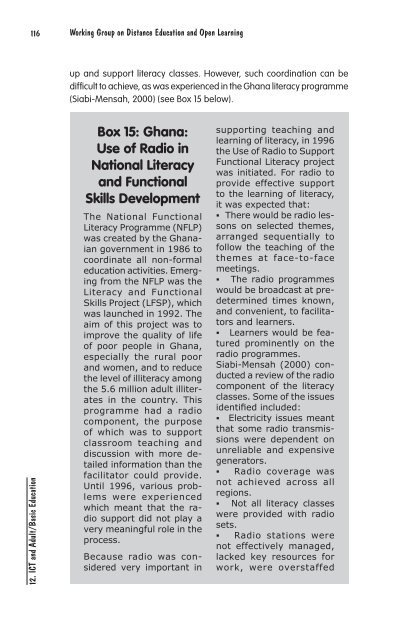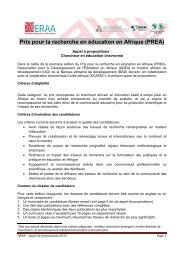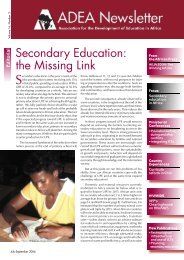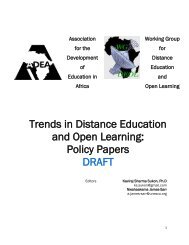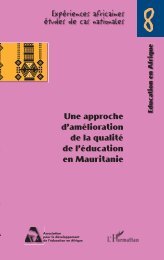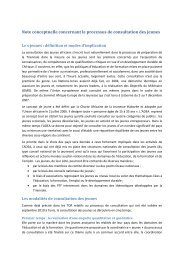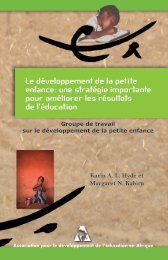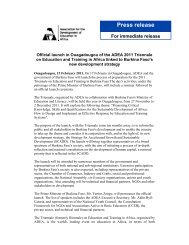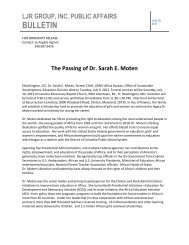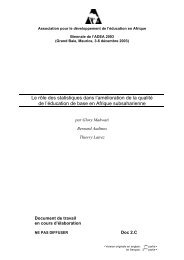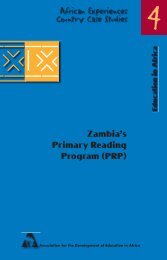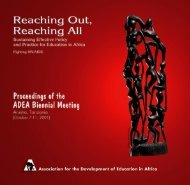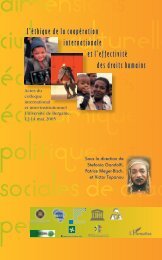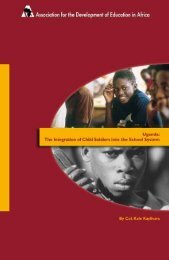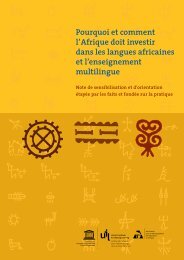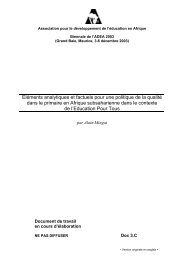Technological Infrastructure and Use of ICT in Education in ... - ADEA
Technological Infrastructure and Use of ICT in Education in ... - ADEA
Technological Infrastructure and Use of ICT in Education in ... - ADEA
Create successful ePaper yourself
Turn your PDF publications into a flip-book with our unique Google optimized e-Paper software.
116 Work<strong>in</strong>g Group on Distance <strong>Education</strong> <strong>and</strong> Open Learn<strong>in</strong>g<br />
up <strong>and</strong> support literacy classes. However, such coord<strong>in</strong>ation can be<br />
difficult to achieve, as was experienced <strong>in</strong> the Ghana literacy programme<br />
(Siabi-Mensah, 2000) (see Box 15 below).<br />
12. <strong>ICT</strong> <strong>and</strong> Adult/Basic <strong>Education</strong><br />
Box 15: Ghana:<br />
<strong>Use</strong> <strong>of</strong> Radio <strong>in</strong><br />
National Literacy<br />
<strong>and</strong> Functional<br />
Skills Development<br />
The National Functional<br />
Literacy Programme (NFLP)<br />
was created by the Ghanaian<br />
government <strong>in</strong> 1986 to<br />
coord<strong>in</strong>ate all non-formal<br />
education activities. Emerg<strong>in</strong>g<br />
from the NFLP was the<br />
Literacy <strong>and</strong> Functional<br />
Skills Project (LFSP), which<br />
was launched <strong>in</strong> 1992. The<br />
aim <strong>of</strong> this project was to<br />
improve the quality <strong>of</strong> life<br />
<strong>of</strong> poor people <strong>in</strong> Ghana,<br />
especially the rural poor<br />
<strong>and</strong> women, <strong>and</strong> to reduce<br />
the level <strong>of</strong> illiteracy among<br />
the 5.6 million adult illiterates<br />
<strong>in</strong> the country. This<br />
programme had a radio<br />
component, the purpose<br />
<strong>of</strong> which was to support<br />
classroom teach<strong>in</strong>g <strong>and</strong><br />
discussion with more detailed<br />
<strong>in</strong>formation than the<br />
facilitator could provide.<br />
Until 1996, various problems<br />
were experienced<br />
which meant that the radio<br />
support did not play a<br />
very mean<strong>in</strong>gful role <strong>in</strong> the<br />
process.<br />
Because radio was considered<br />
very important <strong>in</strong><br />
support<strong>in</strong>g teach<strong>in</strong>g <strong>and</strong><br />
learn<strong>in</strong>g <strong>of</strong> literacy, <strong>in</strong> 1996<br />
the <strong>Use</strong> <strong>of</strong> Radio to Support<br />
Functional Literacy project<br />
was <strong>in</strong>itiated. For radio to<br />
provide effective support<br />
to the learn<strong>in</strong>g <strong>of</strong> literacy,<br />
it was expected that:<br />
• There would be radio lessons<br />
on selected themes,<br />
arranged sequentially to<br />
follow the teach<strong>in</strong>g <strong>of</strong> the<br />
themes at face-to-face<br />
meet<strong>in</strong>gs.<br />
• The radio programmes<br />
would be broadcast at predeterm<strong>in</strong>ed<br />
times known,<br />
<strong>and</strong> convenient, to facilitators<br />
<strong>and</strong> learners.<br />
• Learners would be featured<br />
prom<strong>in</strong>ently on the<br />
radio programmes.<br />
Siabi-Mensah (2000) conducted<br />
a review <strong>of</strong> the radio<br />
component <strong>of</strong> the literacy<br />
classes. Some <strong>of</strong> the issues<br />
identified <strong>in</strong>cluded:<br />
• Electricity issues meant<br />
that some radio transmissions<br />
were dependent on<br />
unreliable <strong>and</strong> expensive<br />
generators.<br />
• Radio coverage was<br />
not achieved across all<br />
regions.<br />
• Not all literacy classes<br />
were provided with radio<br />
sets.<br />
• Radio stations were<br />
not effectively managed,<br />
lacked key resources for<br />
work, were overstaffed


